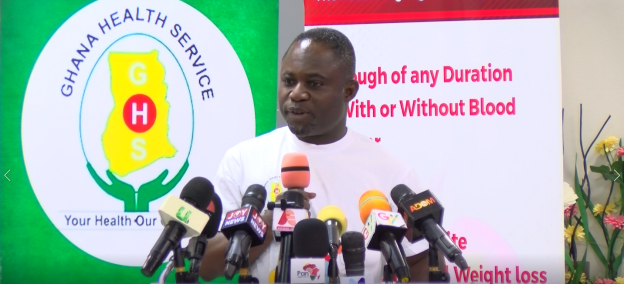Ghana joined the global community in commemorating World Tuberculosis (TB) Day 2025 under the theme: “Yes! We Can End TB: Commit, Invest, Deliver.”
The event, held in the Ministry of Health’s conference room, brought together stakeholders, health professionals, and members of the public, underscoring the country’s commitment to eradicating the disease.
While some attendees hoped to catch a glimpse of First Lady Dr. Lordina Mahama, others arrived with expectations of free TB screenings and medical checkups, only to leave disappointed due to the absence of treatment provisions. Among them was Kwaku, a yogurt seller, who had been battling a persistent cough for over two weeks. “I came hoping to get treated, especially since it was supposed to be free,” he said, visibly disheartened by the lack of on-site medical support.
Government’s Commitment to Ending TB
Delivering the keynote address, Minister of Health Kwabena Mintah Akandoh reaffirmed the government’s top priority to eliminate TB. He highlighted ongoing interventions, including the expansion of rapid molecular testing platforms and the establishment of more treatment centers. “We are working with partners to intensify our efforts, reduce stigma, and encourage community engagement,” he stated.
According to data from the Noguchi Memorial Institute for Medical Research, over 20,599 TB cases were recorded in Ghana in 2024, a figure health experts describe as alarming. Despite this, the Health Minister reassured Ghanaians that TB is not a death sentence and reiterated the government’s goal to eradicate the disease by 2030.
Health Experts Applaud Progress in TB Treatment
Professor Dorothy Yeboah-Manu, Director of the Noguchi Memorial Institute for Medical Research, praised the contributions of health professionals and researchers in the fight against TB. “Yes, we can end TB. We have intensified research and produced effective drugs that can combat the infecting pathogen,” she emphasized. She commended the National Tuberculosis Control Programme for its leadership in managing the disease.
Dr. Yaw Adusi-Poku, Project Manager of the National TB Control Programme, announced that new TB drugs are now available and are being distributed to health centers nationwide. “Treatment remains free and accessible through 24-hour service centers,” he assured, adding that awareness campaigns on treatment locations have been ongoing.
Funding Challenges and the Role of WHO
With the suspension of USAID funding, Dr. Frank Lule, World Health Organization (WHO) Country Representative, stressed the need for a dedicated, fully funded budget to sustain TB control efforts. “Increased domestic investment is crucial to reducing the burden on affected communities and ensuring the availability of essential medical supplies,” he noted. WHO, he added, remains committed to mobilizing resources, strengthening healthcare systems, and working with stakeholders to end the TB epidemic.
Dr. Badu Sarkodie, Director of Public Health at the Ghana Health Service (GHS), applauded the National TB Control Programme for developing the TB Prevention Therapy (TPT), designed to curb the spread of the disease. However, he revealed that $13 million is needed to fund the nationwide rollout. He also warned that indoor and outdoor pollution, asthma, smoking, and pneumonia contribute to poor lung health, urging Ghanaians to undergo voluntary TB testing.
A Call to Action
Tuberculosis, caused by the bacterium Mycobacterium tuberculosis, remains the world’s leading infectious disease killer, claiming 4,500 lives daily. World TB Day, observed annually on March 24, serves as a reminder of the devastating health, social, and economic impact of the disease and calls for urgent action in the fight to end it.
With the combined efforts of the government, healthcare institutions, and global partners, Ghana continues to push towards a TB-free future, emphasizing early detection, accessible treatment, and sustained investment in public health initiatives.


